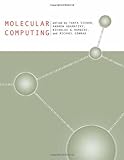Molecular computing / edited by Tanya Sienko ... [et al.].
Material type: TextPublication details: Cambridge, Mass. : MIT Press, c2003.Description: xvii, 257 p. : ill.; 23 cmISBN:
TextPublication details: Cambridge, Mass. : MIT Press, c2003.Description: xvii, 257 p. : ill.; 23 cmISBN: - 0262194872 (hc. : alk. paper)
- 621.391 21
| Item type | Current library | Call number | Copy number | Status | Date due | Barcode | |
|---|---|---|---|---|---|---|---|
 Books
Books
|
Main library General Stacks | 621.391 / SI.M 2003 (Browse shelf(Opens below)) | 1 | Available | 005879 | ||
 Books
Books
|
Main library General Stacks | 621.391 / SI.M 2003 (Browse shelf(Opens below)) | 4 | Available | 002646 |
Browsing Main library shelves, Shelving location: General Stacks Close shelf browser (Hides shelf browser)

|

|

|

|

|

|

|
||
| 621.39 / MA.D 2007 Digital design / | 621.39028553 / ZW.D 2010 Digital system design with SystemVerilog / | 621.391 / SI.M 2003 Molecular computing / | 621.391 / SI.M 2003 Molecular computing / | 621.3916 / LE.V 2008 VLIW microprocessor hardware design : | 621.3916 / SH.M 2003 Modern processor design : | 621.3916 / SH.M 2003 Modern processor design : |
Includes bibliographical references and index.
In Memoriam / Nicholas G. Rambidi -- Introduction: What Is Molecular Computing? -- Conformation-Based Computing: A Rationale and a Recipe / Michael Conrad, Klaus-Peter Zauner -- Molecular Recognition: Storage and Processing of Molecular Information / Tanya Sienko, Jean-Marie Lehn -- Computing in Reaction-Diffusion and Excitable Media: Case Studies of Unconventional Processors / Andrew Adamatzky -- Chemical-Based Computing and Problems of High Computational Complexity: The Reaction-Diffusion Paradigm / Nicholas G. Rambidi -- DNA Computing and Its Frontiers / Carlo C. Maley -- Bioelectronics and Protein-Based Optical Memories and Processors / Duane L. Marcy, Bryan W. Vought, Robert R. Birge -- Bioelectronics and Biocomputers / Satoshi Sasaki, Isao Karube.
The next great change in computer science and information technology will come from mimicking the techniques by which biological organisms process information. To do this computer scientists must draw on expertise in subjects not usually associated with their field, including organic chemistry, molecular biology, bioengineering, and smart materials. This book provides an introduction to the interdisciplinary field of molecular computing. The book moves from abstract principles of molecular computing to the building of actual systems. The topics include the use of proteins and other molecules for information-processing, molecular recognition, computation in nonlinear media, computers based on physical reaction-diffusion systems found in chemical media, DNA computing, bioelectronics and protein-based optical computing, and biosensors.
1
There are no comments on this title.
